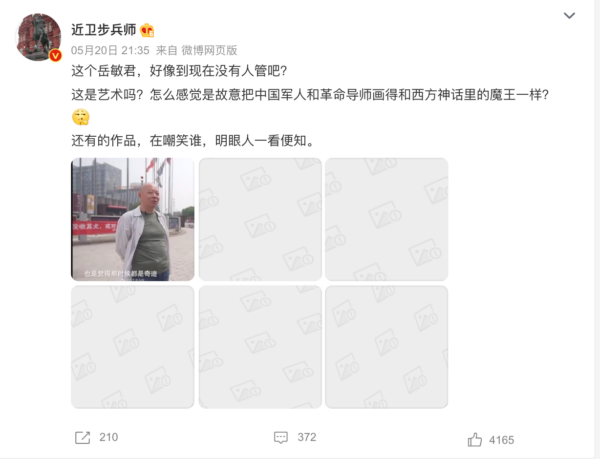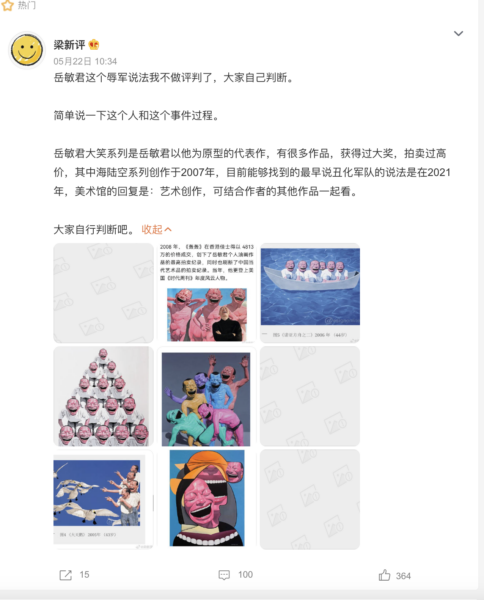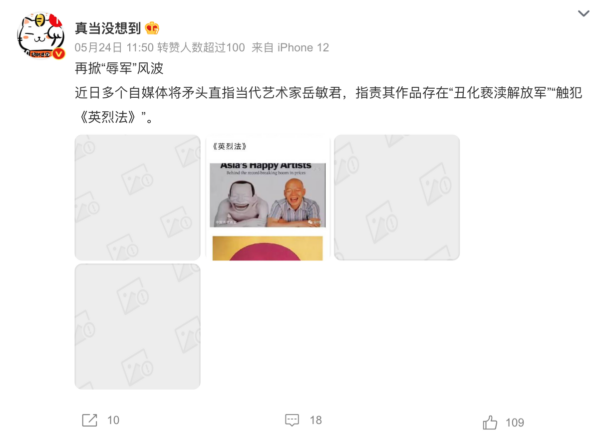If the lesson last week was “Don’t laugh about the PLA,” this week’s message seems to be, “Don’t even crack a smile.”
First, stand-up comedian Li Haoshi (stage name “House”) was accused of defaming the People’s Liberation Army (PLA) because of a joke he made that referenced a PLA slogan and seemed to liken stray dogs to soldiers. House was deplatformed, pressured to apologize, and placed under police investigation, while the Shanghai comedy studio that employs him was fined nearly $2 million dollars and had their performances suspended indefinitely. At least one of House’s online defenders was arrested.
Now it appears that one of China’s most renowned contemporary painters, Beijing-based Yue Minjun (岳敏君), has been targeted by online nationalists who accuse him of “insulting the military” and “defaming revolutionary heroes and martyrs.” Painting in a style has been dubbed “Cynical Realism,” Yue is well known for his colorful, off-kilter, and instantly recognizable paintings of wide-mouthed, toothily grinning or laughing men—all of whom bear a close resemblance to the artist himself. Many of his works are sold at auction, exhibited in museums, or held in private collections. At a 2007 auction at Sotheby’s London, his painting “Execution” sold for £2.9 million pounds ($5.9 million U.S. dollars), “making it the most expensive Chinese contemporary artwork sold on the secondary market at the time.”
Some of the paintings currently being criticized are from “Land, Sea, and Air,” a series that dates back to 2007 and depicts Yue Minjun’s iconic grinning men in military garb, or in military and historical settings. It is not clear why these old accusations of “insulting the military” have been warmed over and resurrected now, but it is likely a symptom of heightened sensitivity—from the government, state media, and nationalist online commentators—toward any criticism of the Chinese military in any context.
A series of screenshots collected from Weibo indicate that at least some of Yue’s iconic paintings are being censored online:

Screenshot 1:
[Username] 近卫步军师 (Jinweibu Junshi)
May 20 at 9:35 p.m., from Weibo web versionThis Yue Minjun—has no one been paying attention to this guy?
Is this art? Why does it feel like he deliberately painted Chinese soldiers and revolutionary heroes to look like devils from Western mythology?
In some of his other paintings, any clear-eyed person can tell exactly who he’s mocking.
(This Weibo post has 210 shares, 372 comments, and 4165 likes.)

Screnshot 2:
[Username] 梁新评 (Liang Xinping)
May 22 at 10:34 a.m.I’m not going to give my opinion of this talk about Yue Minjun “defaming” the military, since everyone has already passed judgment.
I’m just going to talk a bit about the man himself, and about the course of events.
Yue Minjun’s “Laughter” series, which is modeled on himself, is his most representative work. Many of his artworks have won major awards and fetched high prices at auction. Among these, his “Land, Sea, and Air” series was created in 2007. The earliest mention that I could find about him “defaming” the military dates from 2021. The art museum responded by saying: “As with any creative work, it should be viewed in the context of the artist’s larger body of work.”
Why don’t you judge for yourselves?
(This Weibo post has 15 shares, 100 comments, and 364 likes.)

Screenshot 3:
[Username] 真当没想到 (Zhendang Mei Xiang Dao)
May 24 at 11:50 a.m. from iPhone 12. Has received over 100 likes.Accusations of “insulting the military” surge again.
In recent days, a number of “self-published media” accounts have been pointing the finger at contemporary artist Yue Minjun, accusing his works of “defaming and blaspheming the PLA” and “violating the ‘Law on the Protection of Heroes and Martyrs.’”
(This Weibo post has 10 shares, 18 comments, and 109 likes.)
Given the surge of criticism that Yue’s works depict PLA soldiers in an insulting or unflattering light, this quote from the artist, which first appeared in a 2014 art magazine article, is as timely as ever:
“These idiotically laughing people aren’t just the stuff of a moment, some brief period of time—they’re more like the long-term state of our nation. Of course, that’s not something I really want to see, but since that’s our status quo, I think I ought to continue producing them.” [Chinese]
Alexander Boyd contributed to this post.






